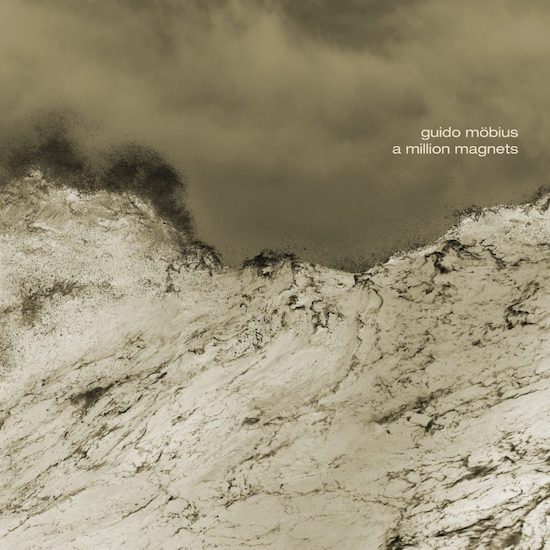Before it became a subject of Insane Clown Posse-inspired memes, magnetism had long been an earnest fascination of musicians and artists alike. From Karlheinz Stockhausen’s warping tapes and the dynamic sculptures of Panayiotis Vassilakis (Takis) to contemporary examples like Francisco Meirino’s experiments with invisible fields and Lea Bertucci’s collages, almost magical traits have often been ascribed to magnetic forces. They allow interaction with the otherwise intangible, manifesting phenomena that might truly seem miraculous, but also act as sources of indeterminism. The magnets in the title of Berlin-based producer and multi-instrumentalist Guido Möbius’s new album are not quite that literal. Instead, they appear as thought-experiments. Mimicking a sort of metaphorical magnetism, these imagined laws shape and direct the seven compositions, instilling in them a motorik, propulsive drive.
The first of the two poles that hold A Million Magnets together comes in the form of Andrea Belfi’s percussive work. Recorded during sessions that the Italian composer, drummer, and percussionist did for Möbius’s 2016 record Batagur Baska, his lines and accents possess a distinct edge based on counterpoints such as those between breezy cymbal rim hits and the floor-shaking rumble of toms. It’s a style that is simultaneously loose, nigh meditative, and galvanised, reminiscent of Belfi’s similarly exciting, fluttering drum work that can be heard on collaborations with David Grubbs. As it turns out, it is also the perfect anchor for the album’s other pole: Möbius’s array of analogue and digital effects and instruments.
Only occasionally choosing to manipulate Belfi’s original recordings, Möbius plasters the flesh of his compositions onto these skeletons, following and probing their patterns with layers of guitar riffs, modulating synth lines, voices, and dense drones that all seem to oscillate – like a million little magnets – around the central cadences. The resulting music is a rhythmically and texturally rich amalgam of electronic tropes characteristic of krautrock, Fourth World aesthetics and Möbius’s own other works, that lands somewhere between Tomaga, Pelt, and the hypnotic improvisations of O Yama O.
Cymbals circulate as if locked onto a metronome on ‘Abayanga’ and raise a folksy whirlwind of droning noises, claps, and screeching guitar tremolos. Quivering synthesizer stabs join in a dance with guest singer Yuko Matsuyama’s spoken word and cut through rolling toms on ‘Schlucht’. ‘Windjammer’ finds a concertina whistling in the middle of a storm, its melodies broken by gusts of distortion. Meanwhile, ‘Discrete Wiring’ and ‘Feed Me Fog’ provide gentle padding through feedback and sounds that move in reverse, before high speed hi-hats drive everything mad on ‘Chayyam’. Here, violently bowed and scraped strings wrap Cambodian singer Prak Chum’s bewitched mantras into a grave, strident ending to an otherwise charming album.


